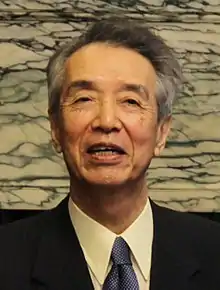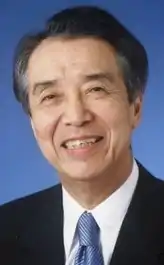Bunmei Ibuki
Bunmei Ibuki (伊吹 文明, Ibuki Bunmei, born 9 January 1938)[1] is a Japanese politician.
Bunmei Ibuki | |
|---|---|
伊吹 文明 | |
 | |
| Speaker of the House of Representatives | |
| In office 26 December 2012 – 21 November 2014 | |
| Monarch | Akihito |
| Preceded by | Takahiro Yokomichi |
| Succeeded by | Nobutaka Machimura |
| Member of the House of Representatives for Kyoto's 1st District | |
| Assumed office 19 December 1983 - present | |
| Minister of Education, Culture, Sports, Science and Technology | |
| In office 26 September 2006 – 26 September 2007 | |
| Prime Minister | Shinzō Abe |
| Preceded by | Kenji Kosaka |
| Succeeded by | Kisaburo Tokai |
| Personal details | |
| Born | 9 January 1938 Kyoto, Empire of Japan |
| Political party | Liberal Democratic Party of Japan |
| Alma mater | Kyoto University |

.jpg.webp)
He was born in Kyoto to a family of textile wholesalers who had operated the business since the Edo period. He graduated with a BA from Kyoto University's economics department in 1960. At Kyoto University he was a member of the tennis club. Upon graduation Ibuki became a bureaucrat at the Ministry of Finance. He was dispatched to the Japanese embassy in London in 1965, where he stayed for four years.[2]
Ibuki entered politics in 1983 at former Finance Minister Michio Watanabe's behest. He is a member of the Liberal Democratic Party (LDP) and has served in a variety of government positions, including Minister of Labour (1997~98) and National Public Safety Commission chairman (2000~01).
He was appointed Minister of Education, Culture, Sports, Science, and Technology on 26 September 2006 as a part of Prime Minister Shinzō Abe's first cabinet. In this position, he promoted the controversial revision of the Fundamental Law of Education. He was subsequently appointed as Secretary-General of the LDP in September 2007;[3] less than a year later, he was replaced in that position by Taro Aso and was instead appointed as Minister of Finance.[4] He is known for his knowledge of finance and tax and welfare policies.[5] He held the post of Finance Minister for less than two months, however, and was replaced by Shōichi Nakagawa in the Cabinet of Prime Minister Taro Aso, appointed on 24 September 2008.[6]
On 26 December 2012, Bunmei Ibuki was elected Speaker of the House of Representatives of Japan. He presided over the day of his inauguration, the election of Prime Minister Shinzō Abe.
Personal life
- Ibuki is a fluent English speaker[5] and a believer of Tenrikyo.[7] He is a member of the openly revisionist lobby Nippon Kaigi,[8] and affiliated to the fundamentalist shinto lobby Shinto Seiji Renmei Kokkai Giin Kondankai (神道政治連盟国会議員懇談会).
- Ibuki is calling "Ibu-King", because he is a one of very old politician and he has a very strong political power.
Honours
 Netherlands: Knight Grand Cross of the Order of Orange-Nassau (29 October 2014)[9]
Netherlands: Knight Grand Cross of the Order of Orange-Nassau (29 October 2014)[9]
References
- Prime Minister of Japan official website - "Minister of Education, Culture, Sports, Science and Technology", retrieved 24 September 2007.
- Ibuki official website; accessed 24 September 2007. (in Japanese)
- "Fukuda appoints Ibuki as secretary-general, Tanigaki as policy chief", Mainichi Daily News, 24 September 2007.
- "Fukuda overhauls Cabinet / LDP executive shakeup also elevates Aso to party No. 2", The Yomiuri Shimbun, 2 August 2008.
- Japan Times, "Fukuda's new lineup", 3 August 2008.
- "Aso elected premier / Announces Cabinet lineup himself; poll likely on Nov. 2", The Yomiuri Shimbun, 25 September 2008.
- http://www.jcp.or.jp/akahata/aik07/2007-04-09/2007040914_01_0.html
- Nippon Kaigi website - 5 years: nipponkaigi.org/voice/5years - 10 years: nipponkaigi.org/about/10years
- Decoraties Staatsbezoeken Japan en Republiek Korea Archived 2014-11-04 at the Wayback Machine - website of the Dutch Royal House
External links
- Discussions on Japanese politics and education (Streaming and mp3)
| House of Representatives of Japan | ||
|---|---|---|
| Preceded by N/A |
Representative for the Kinki PR block 2009– |
Incumbent |
| New district | Representative for Kyoto 1st district (single-member) 1996–2009 |
Succeeded by Tomoyuki Taira |
| Preceded by Mikio Okuda Isaji Tanaka Eiichi Nagasue Hiroko Fujiwara Katsuhiko Takeuchi |
Representative for Kyoto 1st district 1983–1996 Served alongside: Katsuhiko Takeuchi, Eiichi Nagasue, Masaru Umeda, Mikio Okuda, Hiroko Fujiwara, Yukio Takemura, Keiji Kokuta, Seiji Maehara, Yuzuru Takeuchi |
District eliminated |
| Preceded by Takahiro Yokomichi |
Speaker of the House of Representatives of Japan 2012–2014 |
Succeeded by Nobutaka Machimura |
| Preceded by Yuzuru Shimasaki |
Chair, House of Representatives Committee on Education 1994–1995 |
Succeeded by Hakuo Yanagisawa |
| Political offices | ||
| Preceded by Yutaka Okano |
Minister of Labour 1997–1998 |
Succeeded by Akira Amari |
| Preceded by Osamu Nishida |
Minister of State, Chairman of the National Public Safety Commission 2000–2001 |
Succeeded by Jin Murai |
| New title | Minister of State for Disaster Management 2001 | |
| Preceded by Kenji Kosaka |
Minister of Education, Culture, Sports, Science and Technology 2006–2007 |
Succeeded by Kisaburō Tokai |
| Preceded by Fukushiro Nukaga |
Minister of Finance 2008 |
Succeeded by Shoichi Nakagawa |
| Party political offices | ||
| Preceded by Taro Aso |
Secretary General of the LDP 2007–2008 |
Succeeded by Taro Aso |
| Preceded by Shizuka Kamei (Kamei faction) |
Chairman of Shisuikai (Ex-Kamei→Ibuki faction) 2005–2012 |
Succeeded by Toshihiro Nikai |
| Honorary titles | ||
| Preceded by Shizuka Kamei |
Oldest member of the House of Representatives of Japan 2017– |
Incumbent |